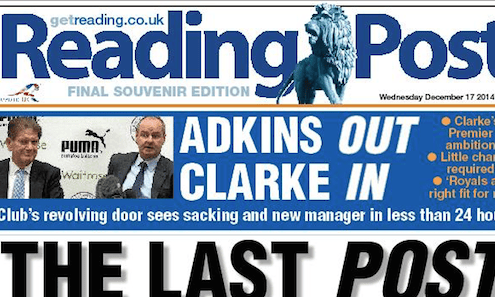Reading Post bids a print farewell and welcomes an online future

The Reading Post has just published its final issue after its owner, Trinity Mirror, decided to stop publishing its newsprint version.
One of the Post’s articles relates the paper’s 49-year history while another explains the virtues of its online future.
Launched as the Evening Post on 14 September 1965, the Post was then regarded as “the most technologically advanced paper in the country.”
In 1991, it became a tabloid, and three years later it was acquired by the Guardian Media Group (GMG). It turned from a daily into a weekly in May 2009 before GMG sold it on to Trinity Mirror the following year.
Now Trinity Mirror aims, its says, to continue the Post’s legacy of being at the forefront of innovation by focusing on a digital-only approach, a change celebrated by Ed Walker, who has been appointed as publisher of getreading.co.uk. He writes:
“The average adult in the UK who owns a smartphone (such as an iPhone) unlocks their phone more than 100 times a day, and by early 2015 the percentage of adults with a smartphone is set to pass 80%.We have to ensure getreading is one of those key places people turn to when unlocking their phone, be it for a quick catch-up on the latest news or an in-depth read on the issues affecting our town.”
I think that this move by the Reading Post to move online signals the future of online journalism and newspapers. It is economically unsustainable for the larger newspapers to continue to focus on their print platform let alone smaller papers such as this one. I do however think that the newspaper may struggle online to gain enough revenue from advertising to continue, considering that the Sun is making losses with 225,000 subscribers, it is very difficult for newspapers to make profit. I therefore think that in the future all newspapers will go online and most likely behind a pay wall, and I think that this will mean the end of smaller brands such as this one going bust because people are only going to subscribe to a few popular brands and not lesser known ones, meaning that in the future I think only the major news institutions are likely to be around, unless smaller and local newspapers can gain funding from someone like the BBC.
No comments:
Post a Comment